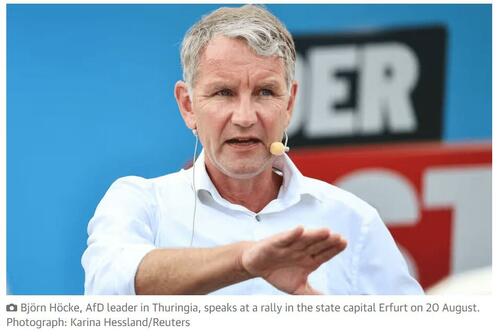
Support For AfD Surges In Germany After Knife Attack Leaves 3 Dead
Authored by Mike Shedlock via MishTalk.com,
In the wake of three fatal stabbings by a Syrian immigrant whose asylum was denied, the anti-immigration AfD may win three state elections in September.
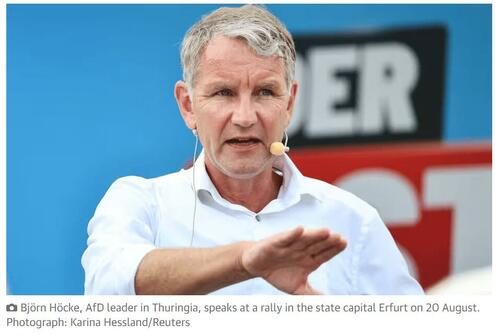
Knife Attack
NPR reports Man claiming to be behind Solingen knife attack turns himself in, German police say.
A 26-year-old Syrian asylum-seeker turned himself in to police, saying he was responsible for the Solingen knife attack that left three dead and eight wounded at a festival marking the city’s 650th anniversary, German authorities announced early Sunday.
On Saturday the Islamic State militant group claimed responsibility for the attack, without providing evidence. The extremist group said on its news site that the attacker targeted Christians and that he carried out the assaults Friday night “to avenge Muslims in Palestine and everywhere.” The claim couldn’t be independently verified.
The attack comes amid debate over immigration ahead of regional elections next Sunday in Germany’s Saxony and Thueringia regions where anti-immigration parties such as the populist Alternative for Germany are expected to do well.
According to Reuters, Thuringia and Saxony vote on Sept. 1 and Brandenburg follows on Sept. 22. Combined, the three states have around 8.5 million inhabitants and account for 10% of Germany’s population.
The far-right AfD is expected to emerge as the strongest party in these elections. It may be difficult or impossible for an anti-AfD coalition to suppress AfD.
AfD Crowds Cheer Nation’s Most Feared Politician
The Guardian reports AfD Crowds Cheer Nation’s Most Feared Politician
Three eastern German states hold elections next month and, by a quirk of the calendar, the regions up for grabs are among those with the most supporters of the far-right Alternative für Deutschland. If the polls are accurate, the AfD could wind up the strongest party in all three, a year before the planned date of Germany’s next general election. Depending on who you ask, it would be a political earthquake, a catastrophe or a wake-up call for the country.
The strength of the AfD and a new populist upstart, the “leftwing conservative” Bündnis Sahra Wagenknecht (Sahra Wagenknecht Alliance), underlines dovetailing trends in Europe’s top economy: mounting frustration with incumbents, anxiety about Germany’s military support for Ukraine and festering divisions between east and west more than three decades after reunification.
Höcke, 52, co-heads the state chapter of the AfD in Thuringia, which will vote on 1 September along with Saxony. The AfD, polling at about 30%, has been classed as “confirmed rightwing extremist” by the Federal Office for the Protection of the Constitution, the domestic security watchdog, in both states. Brandenburg, the largely rural state surrounding Berlin, will hold its election on 22 September. Its AfD chapter is listed as “suspected rightwing extremist”.
Government Future in Danger
DW reports German Government’s Future in Danger in Regional Elections
Though eastern Germany is often seen as a homogenous region, there are major political differences among the states. While Thuringia has been governed for the last decade by the socialist Left Party under State Premier Bodo Ramelow, Saxony has been led by Michael Kretschmer of the center-right Christian Democratic Union (CDU) since 2017.
In both states, the only possible coalitions that keep the AfD out of government (and all the other parties have promised to do that) appear to be an uncomfortable alliance between the CDU and Sahra Wagenknecht Alliance (BSW). It would be bizarre partnership: The former is a centrist party that likes to present itself as a rock of stability, tradition, and conservatism, the latter an upstart outfit less than a year old run by a former communist with a gift for populist rhetoric.
“Sahra Wagenknecht is a cult figure in eastern Germany. She leads the party autocratically, and she is a focus of the yearning for authority and leadership in the east,” as Vorländer puts it.
An alliance with the BSW, which is polling at nearly 20% in Thuringia and over 10% in Saxony, is likely to be difficult to digest for some in the CDU. Apart from the fact that Wagenknecht was once a member of the Socialist Unity Party of Germany (SED) in the communist East German dictatorship, she is already making demands that will be difficult for the CDU to accept. For instance, that it should declare itself against the stationing of US medium-range ballistic missiles in Germany.
And though the BSW has consistently distanced itself from the far-right AfD and ruled out any cooperation, one fact looms uncomfortably over this election: The two parties have more in common than sets them apart.
All this leaves Scholz’s SPD in a desperate situation, especially because another eastern German state, Brandenburg, will hold an election three weeks later. Here, too, the AfD is leading the polls, with the SPD and CDU vying for second place.
Yet in some ways, it is Scholz’s coalition partners that have the most to fear from these three elections. The Green Party, currently in government in all three states, is likely to lose that influence, while the neoliberal Free Democrats (FDP) are facing annihilation in the East — probably as punishment for hitching their wagon to the Scholz train. That does not bode well for Scholz’s already fractious coalition.
SPD on the Brink of Extinction
SPD is hovering around 5 percent in opinion polls in both Saxony and Thuringia.
That is the threshold to have any representation in Government.
Saxony Polls
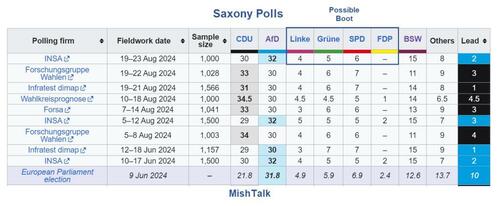
Die Linke (the Left), the Greens, SPD, and FDP are all on the 5 percent boot threshold.
They all deserve the boot. But that does not imply cheering for any of them.
Thuringia Polls
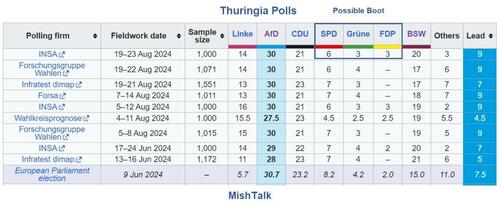
Die Linke is much stronger in Thuringia than Saxony.
Brandenburg Polls
Be prepared to kiss FDP goodbye in a clean sweep.
The Greens appear to go up in flames in Thuringia and hopefully across the board.
The more parties that get booted, the harder it will be to form any coalitions.
It will be impossible to exclude both AfD and BSW. Both are anti-immigration, pro-Russia.
National Elections
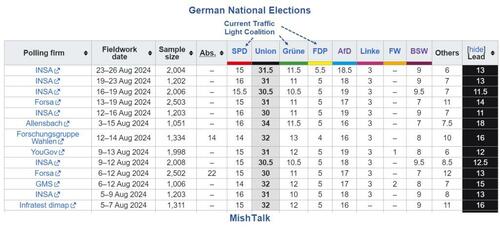
The next national election has been set for Sept. 28, 2025.
Chancellor Olaf Scholz says he will run for a second term, but support for his SPD party has collapsed.
The famed traffic light coalition is unworkable with combined support down to 48.5 percent with FDP on the bubble. FDP deserves to get booted for agreeing to join the current coalition mess.
Anyone for another failed “Grand Coalition” between CDU/CSU and SPD?
Tyler Durden
Thu, 08/29/2024 – 06:30







![Prezes aż się poderwał z miejsca, Błaszczak i Berkowicz o włos od starcia! „Zalecam nie zgrywać chojraka” [WIDEO]](https://crowdmedia.pl/wp-content/uploads/2024/11/1berkowicz.jpg)


